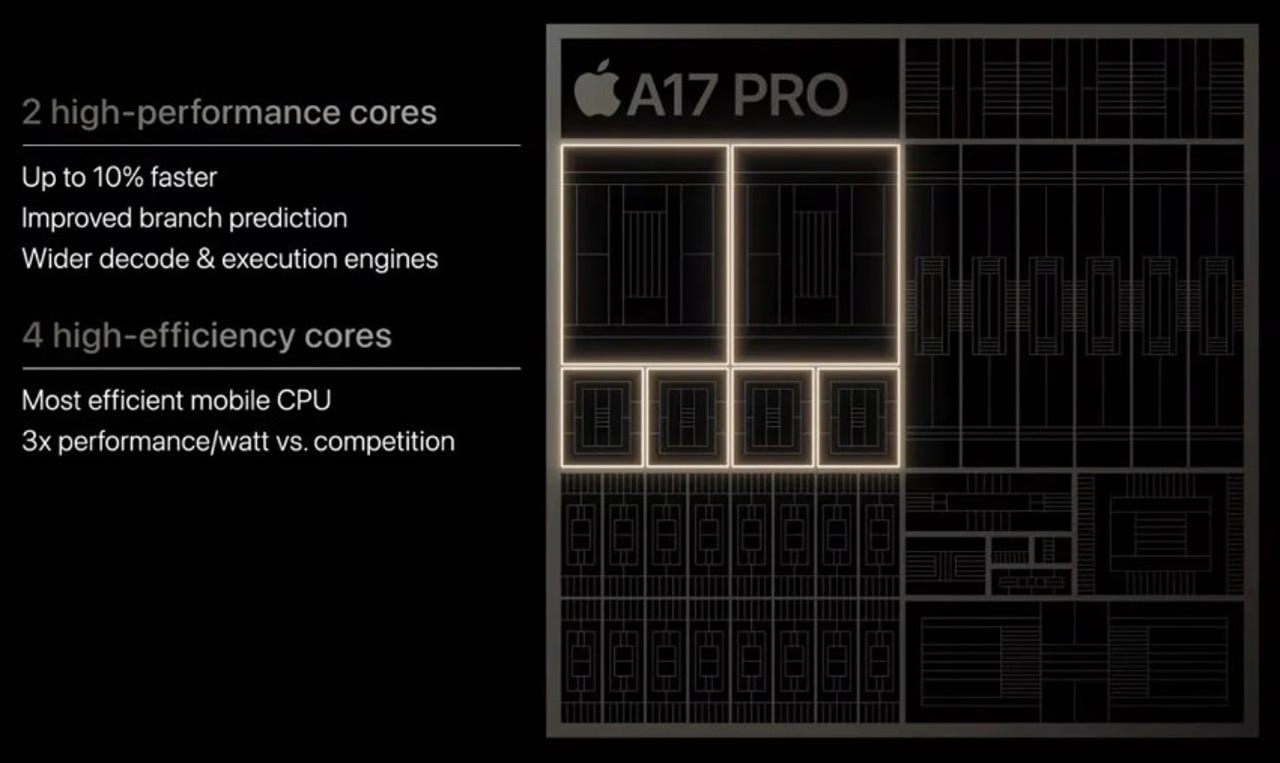
































Apple's A17 Pro chip.
Apple/While the iPhone 15 gets the older A16 Bionic chip currently powering the iPhone 14 Pro and Pro Max handsets, the iPhone 15 Pro and Pro Max handsets get an entirely new chip -- the A17 Pro.
Also: Everything Apple announced today: iPhone 15, Apple Watch Ultra 2, AirPods
OK, let's start with the basics: The A17 Pro is Apple's first chip based on a 3-nanometer semiconductor manufacturing process, and a substantial jump down from the 5-nanometer process being used in the A16 Bionic. A smaller manufacturing process means more transistors can be placed closer together on the silicon die in the chip, making for a smaller, faster, cooler, more power-efficient chip.
According to Apple, these transistors are so small that some of their elements are only 12 silicon atoms wide, which is taking things to an extreme level of tiny.
And each chip features 19 billion transistors, an increase of six billion from the A16 Bionic.
As far as cores go, the A17 Pro is the same as its predecessor, featuring two high-performance cores and four energy-efficient cores, although we don't as yet know the speed at which these cores run (the cores found in the A16 Bionic run at 3.46 GHz and 2.02 GHz, respectively), but Apple has said that they are 10 percent faster, have improved branch prediction for faster code execution, and the decode and execution engines have higher bandwidths.
Apple claims that the A17 Pro is the fastest single-threaded mobile CPU -- and of this claim, I have no doubt, considering that the competition has a hard time keeping up with the A16 Bionic -- with performance that rivals high-end PCs.
The efficiency cores are also the "most efficient mobile CPU" and deliver three times the performance/watt compared to the competition.
Also: iPhone 15 Pro vs. iPhone 14 Pro: Which Pro model is right for you?
The neural engine -- the part of the chip that handles the machine learning and carries out tasks such as on-device voice recognition, autocorrect, or deciding what subjects are in the photos you take for the purposes of indexing -- has 16 cores -- same as the A16 Bionic -- but gets a 2x performance boost, and is capable of carrying out 35 trillion operations per second.
Also built into the A17 Pro are dedicated engines that process video in the ProRes codec, an AV1 video decoder, and an engine that powers ProMotion and the always-on display.
Because the Lightning port has been swapped out for USB-C, Apple also has added a dedicated USB 3 controller that supports transfer speeds up to 10 gigabits per second.
But what about the GPU?
The A17 Pro features a completely redesigned GPU
Apple/This GPU is, according to Apple, "groundbreaking" and "brand new" and a GPU that Apple labels as "pro class." It's been redesigned with performance and efficiency in mind, as well as the handling of complex applications, and also includes new rendering features. It features six cores -- one more core than the A16 Bionic -- and as a result, is up to 20 percent faster.
Also: Here's how Apple just made the iPhone 15 Pro much easier to repair
Also -- and this is for game developers and AR developers -- the A17 Pro's GPU features hardware-accelerated ray tracing to improve the accuracy of the light being reflected in rendered scenes. The hardware acceleration allows for four times faster ray tracing compared to software-based rendering and allows for much higher frame rates, and in turn, a more immersive experience.
A new software feature aimed at improving gaming is Metal-effects upscaling, which combines the GPU and neural engine to provide better graphics but with less energy consumption.
There's an awful lot placed into that tiny chip.
 Tags chauds:
technologie
Téléphones intelligents
Tags chauds:
technologie
Téléphones intelligents